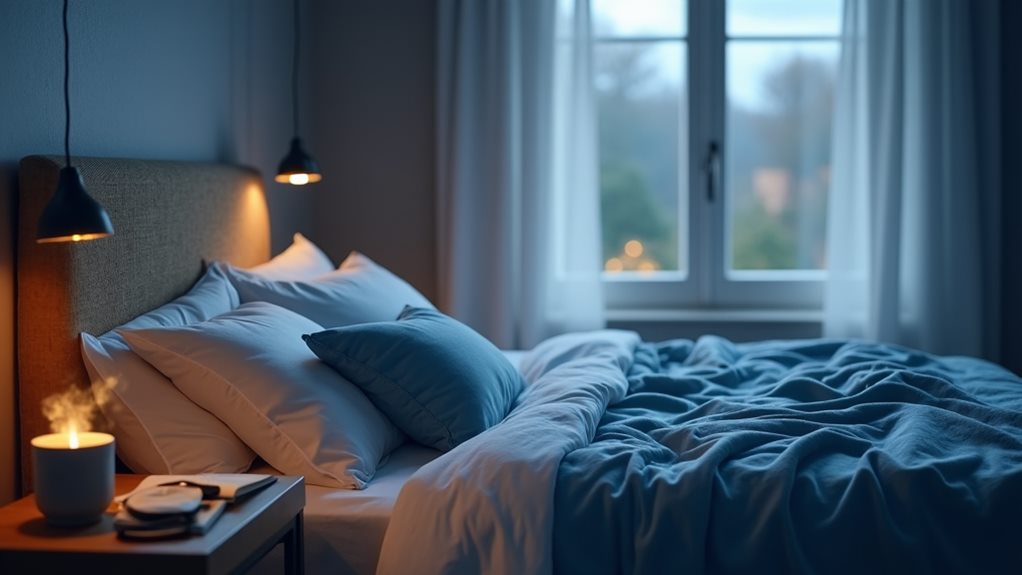
To achieve deeper sleep, create a sanctuary in your bedroom. Use blackout curtains and maintain the room at a cool 60 to 67 degrees Fahrenheit. Stick to a consistent sleep schedule, even on weekends, to sync your body’s clock. Avoid caffeine in the late afternoon, replace nightcaps with water, and indulge in a fiber-rich diet. Embrace relaxation techniques like yoga or meditation to unwind. Regular exercise and gentle pre-sleep rituals can transform sleep quality. These strategic changes pave the way for profound rest. Tap into this powerhouse of rejuvenation and unlock more ways to elevate your sleep game.
Optimize Your Sleeping Space
Creating an ideal sleeping environment is your gateway to a night of rejuvenating sleep. Do you crave those elusive hours of deep rest? Start by transforming your bedroom into a sleep sanctuary. When you exercise regularly, your body naturally becomes more adept at transitioning to sleep, which can enhance the quality of your rest. Additionally, your bed is your throne—embrace it with a comfortable mattress and quality bedding that cradle your body, tailoring support exactly where you need it. Quality sleep starts and ends with a comfortable bed, so don’t skimp on this investment.
The right lighting sets the stage for your body’s natural processes. Install blackout curtains to block out intrusive light and maintain a quiet, dark space that fosters melatonin production. Reducing blue light exposure is crucial, so make it a rule: electronics are off-limits one hour before bed. Your body needs that downtime to transition.
Strike the perfect balance in your room’s temperature range—aim for a cool 60 to 67 degrees Fahrenheit for optimal relaxation. Silence isn’t always golden, though; sometimes white noise can drown out disruptive sounds, promising an uninterrupted, quiet rest. Earplugs work wonders too, offering you a personal bastion of tranquility. Create this sleep-ready space now, and watch as your nights transform dramatically. That peaceful sleep? It’s yours to take.
Maintain a Consistent Routine
Consistency is your ally in the battle for better sleep. A regular sleep schedule powers your body’s circadian rhythm, enhancing your sleep quality. Incorporating mental well-being practices such as mindfulness or reducing screen time can further aid in achieving restful sleep. If you’re dancing between different bedtimes and wake-up alarms, you’re not just losing sleep—you’re compromising your health. Aim for at least seven hours each night; it’s not a suggestion, it’s a necessity. Your path to transforming these seven hours into a revitalizing recharge starts with a consistent routine.
A steady nightly routine is your ticket to healthier sleep. If you’ve been staring at the ceiling for 20 minutes, don’t stew in sleepy frustration. Get up, engage in a relaxing activity outside the bedroom, and return when you’re genuinely tired. Your bedroom should be your sleep sanctuary, not an insomnia battlefield.
Don’t be the weekend warrior who sleeps in, disrupting your sleep-wake cycle and sabotaging your weekday slumber. Keeping a standard routine, even when the weekend beckons with lazy mornings, is crucial. A consistent sleep schedule helps you fall asleep faster, improving your sleep and long-term health. Take control; your disciplined routine is your ultimate guide to sleep success.
Monitor Dietary Habits

Your nightly routine is solid, but your diet’s the silent saboteur of your deep sleep. You might not realize it, but what you eat and drink has a massive impact on your nighttime sleep. Reducing your caffeine intake can prevent disruptions as consuming caffeine too late may interfere with your sleep cycle. Or, those obsessive thoughts about not sleeping could become a self-fulfilling prophecy, leading to less rest and more fatigue. Want better sleep quality? Then it’s time to monitor dietary habits closely. Here’s what you need to know:
- Kick Caffeine: Limit caffeine, including coffee and tea, to the morning. Consuming it within 7 hours of bedtime reduces deep sleep duration by almost an hour. So, ditch that afternoon coffee if you value your rest.
- Balanced Diet: A diet rich in fiber from fruits, vegetables, and whole grains isn’t just good for health—it’s crucial for better sleep quality and sustained deep sleep.
- Curb Alcohol: Sure, alcohol might make you feel sleepy initially, but it guarantees disrupted sleep later on. Skip it if you’re serious about a restful night.
- Avoid Heavy Meals: Late-night heavy meals spike your digestion, leading to disrupted sleep. Opt for lighter snacks if you’re hungry before bed.
In a world that demands your best every morning, achieving deep, quality sleep isn’t a luxury; it’s a necessity. Don’t let poor dietary choices rob you of it!
Practice Relaxation Techniques
Harness the transformative power of relaxation techniques and you’ll unlock the secret to a truly rejuvenating night’s sleep. Banish stress and anxiety by embracing practices like yoga and meditation. They’re not just trendy; they’re scientifically proven methods to cultivate peace of mind and heart, paving the way for improved sleep quality.
Stop tossing and turning. Dive into deep breathing exercises before bed, and watch your heart rate drop. Feel stress melt away as a wave of calm washes over you, perfectly priming you for restful slumber. Adopt progressive muscle relaxation techniques to soothe body and mind seamlessly into deeper sleep stages.
Create your sanctuary with a soothing pre-sleep environment: dim the lights, hit play on calming music or serene nature sounds. These auditory aides aren’t just for ambiance; they’re key players in your quest for a more profound night’s rest.
Consistency is king. Establish a consistent pre-sleep routine rich in relaxation techniques, signaling to your body that it’s time to unwind. It’s not just routine; it’s a ritual of rest. Transform your sleep, and transform your life. What are you waiting for? Dive into serenity tonight!
Evaluate Lifestyle Choices

Tired of sleepless nights? It’s time to evaluate your lifestyle choices. Improving the quality of your sleep often requires making smart adjustments to your daily habits. Here’s how you can transform your nights:
- Physical Activity: Commit to at least 150 minutes of exercise weekly. Regular activity accelerates how quickly you fall asleep and enhances the presence of deep sleep. Don’t just sit there—move!
- Balanced Diet: Your diet has a direct impact on deep sleep duration. Choose meals rich in fiber—think fruits, veggies, and whole grains. Fiber helps regulate blood sugar levels, paving the way for more restful nights.
- Caffeine Consumption: Stop sipping coffee in the afternoon. Science shows caffeine within seven hours of your bedtime can rob you of an entire hour of deep sleep. Crave quality sleep? Limit caffeine to morning hours.
- Alcohol: Swapping alcohol for water before bed could be your ticket to uninterrupted sleep. While booze might make you sleepy at first, it fractures your deep sleep. Cut it out for superior zzz’s.
Anchor all these efforts with a consistent sleep schedule. Regular bed and wake times will solidify your body’s circadian rhythm and promote deeper sleep. Make the change—your rest depends on it.
Prioritize Healthy Sleep Habits
Prioritizing healthy sleep habits is essential for attaining deeper, more restorative sleep. By establishing a consistent sleep schedule, individuals can enhance their body’s natural circadian rhythm, thereby improving sleep quality. Committing to a regular bedtime and wake-up time promotes this rhythm, allowing the body to anticipate sleep and wakefulness cues. Coupled with striving for 7 to 8 hours of sleep each night, these habits provide the foundation for achieving the deep sleep necessary for physical and mental restoration.
Adopting additional measures such as reducing caffeine intake in the hours leading up to bedtime and cultivating a pre-sleep relaxation routine can significantly improve sleep duration and quality. Caffeine can have a pronounced impact, cutting into the duration of deep sleep, leading to a less restorative night’s rest. Meanwhile, engaging in calming activities like reading or gentle stretching right before bed encourages relaxation and prepares the body to transition smoothly into sleep. Finally, creating an optimal sleep environment by ensuring a dark, cool, and quiet bedroom can enhance one’s ability to enter the deeper sleep stages that are critical for overall health. These steps work synergistically to support healthier sleep patterns, benefiting overall wellbeing. By giving sleep the priority it deserves, you stand to gain more energy, better mood, and improved cognitive functioning during your waking hours. Prioritizing these habits helps ensure that sleep becomes a rejuvenating, restful part of your daily routine.














